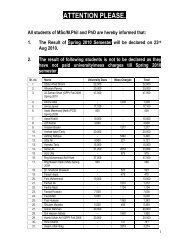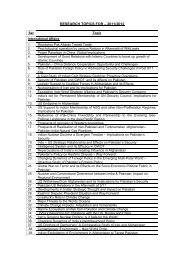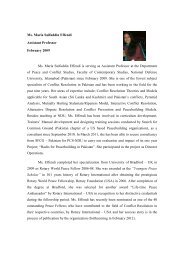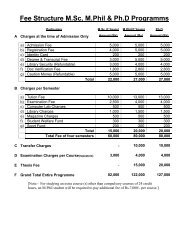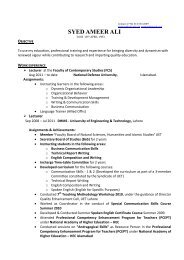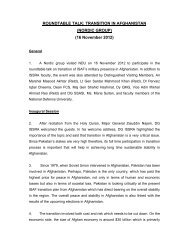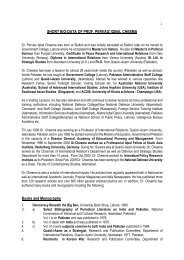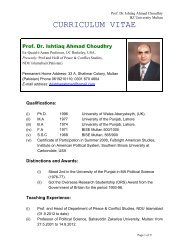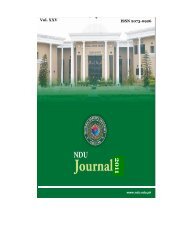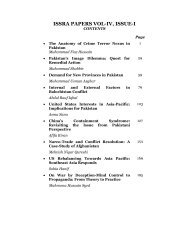OPINION Vol.1, No.1 June 2013 - National Defence University
OPINION Vol.1, No.1 June 2013 - National Defence University
OPINION Vol.1, No.1 June 2013 - National Defence University
You also want an ePaper? Increase the reach of your titles
YUMPU automatically turns print PDFs into web optimized ePapers that Google loves.
develop provincial and district level institutions to monitor and handle demographic and climate<br />
change impacts.<br />
Demography Management. The fast growing population has to be managed through a rigorous<br />
demography management. Following steps are recommended in this regard:-<br />
<br />
<br />
<br />
Population Welfare Programs. An effective population welfare programme to reduce the<br />
rate of population growth can enhance the development effort in a number of ways. A<br />
reduction in the fertility rate would have an immediate effect on the health of mothers and<br />
children and would begin to affect school enrolment rates and education expenditures in short<br />
period.<br />
Education and Female Literacy. A well-funded and rigorous programme for primary and<br />
female literacy is recommended. Besides improving literacy, it would have two direct<br />
impacts; firstly, the Total Fertility Rate will drop affecting the population growth rate.<br />
Secondly, educated women are likely to be more capable of ensuring education choices of the<br />
next generation.<br />
<strong>National</strong> Health Policy. A <strong>National</strong> Health Policy capable to absorb the changes after 18th<br />
amendment is another important factor. It should focus on child mortality & immunization,<br />
life care and emergency services, hygiene and sanitation and old age issues and should focus<br />
on international commitments on MDGs.<br />
Prudent Macroeconomic Management. Synergy in Ministry of Finance, HRD and<br />
Planning Commission to jointly work out Poverty alleviation program under BISP is required.<br />
The Transition should be directed from aid based to Project based self-sustaining Micro and<br />
Macro level management. The need is to work for improvement in creation of job<br />
opportunities through better private public partnership.<br />
HRD. Human capital is the capital in the 21st century world. The study has shown that<br />
demographic dividends will only come our way if we have adequate HRD to encash them.<br />
Following is recommended in this regard:-<br />
Demography. A futuristic and market oriented <strong>National</strong> HRD Policy be framed and<br />
approved at national and provincial level. With developing skilled labour, to meet the global<br />
market demand being the purpose. Also, introducing courses related to economic choices and<br />
decision making by the manpower, entering the labour market as well as youth<br />
entrepreneurship and leadership curriculum in primary and secondary level of education.<br />
Additionally, create ease of doing business, for new entrants in private sector. Concurrently<br />
provide guidance and direction towards the level of expertise and capability to youth, which<br />
can help them in existing competitive world.<br />
Climate Change. Develop climate change professionals’ pool by sending young scientists<br />
and students for higher studies. Moreover, identify the national institutional needs to develop<br />
the capacity for carbon trading under CDM (clean development mechanism). Awareness is<br />
primarily required in the domain of Climate Change. Using all available and appropriate<br />
media, we need to, raise awareness of masses about impacts of trends in demography and<br />
climate change. Education syllabi and traditional sources for information as well as modern<br />
media can play an important role in this sphere. The Information ministry should play the<br />
desired role in this regard.<br />
Mid Term Recommendations<br />
Policy for Urbanization and Better Managed Urban System. Study has shown that both<br />
Climate Change and demography trends are going to supplement the urbanization trends to tackle<br />
the problems arising out of both. Following needs to be done<br />
<br />
<br />
Undertake studies to determine future expansion needs of the existing towns, while<br />
redirecting population migration. Plan new cities along Makran Coast and West of Indus to<br />
mitigate the pressures on existing cities and promote national cohesion<br />
Promote and develop smaller agro-based towns –industrial clusters to discourage rural to<br />
urban migration<br />
<strong>OPINION</strong> <strong>Vol.1</strong> <strong>No.1</strong> 100 <strong>June</strong> <strong>2013</strong>



